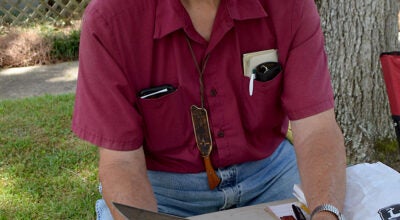Worth the tax?
Published 11:00 pm Thursday, January 31, 2013

If a proposed county tax on gasoline is approved, Pike County residents will pay at least 23 cents in tax for gas purchased inside the county.
Pike Countians to pay more than 20 cents in gas tax if plan approved
If a proposed county tax on gasoline is approved, Pike County residents will pay at least 23 cents in tax for gas purchased inside the county.
The cost would reflect a 5-cents increase on top of the 2, 4, 5, and 7 cents gas taxes already put in place by the state.
“All the money would go to repair and maintain county roads and bridges,” said Pike County Administrator Harry Sanders.
And that is a need that can’t be denied. Pike County Engineer Russell Oliver made a recent presentation to the Pike County Commission that showed the cost for county roads to be resurfaced every 20 years would be more than $1,800,000 per resurfacing year. On top of that, $66,000 would be needed for traffic striping with each resurfacing.
In terms of bridges, Pike County is home to 35 “structurally deficient or functionally obsolete” bridges, according to state guidelines.
“In my 30 years in office, additional taxation was something I fought in every way I could fight,” said Jimmy Lunsford, former Troy mayor. “I think I am speaking from a very conservative viewpoint, and I am not opposed to this tax at all.”
Lunsford said he believes the county is doing “the right thing” to bring county roads up to standards.
“This could be a boom to get all our roads repaired,” said Lunsford, who now owns Development Benefit Associates, LLC and does some work for the Pike County EDC. “Nobody likes new taxes, but I believe the county is doing the right thing.”
If the proposed gas tax does go into effect, the tax in Troy will likely be 24 cents and the tax in Brundidge will probably total 25 cents. That’s because those municipalities already have a 1 and 2 cents gas tax, respectively.
And that money has meant a significant benefit to both cities. In Brundidge, the city collected $87,112 earmarked for street-related work in 2012. In Troy, the amount going into the city’s general fund was $174,000 last year.
Both cities do report that gas tax collections are trending downward, though.
In 2011, Troy reported $186,000 and in 2010, $193,000. Brundidge saw $94,890 in 2011 and $103,000 in 2010.
“It’s hard to tell why the numbers are trending downward,” said Troy City Clerk Alton Starling. “The same people are reporting, they just aren’t reporting as much.”
Currently, the only gas tax benefits Pike County is seeing come from a portion of the state tax distributed to the county, as well as municipalities.
The state levies gas taxes separately. The 2-cents tax is really an inspection fee imposed on gasoline and diesel fuel; the 4-cents tax is levied on gasoline and lubricating oil; the 5-cents tax goes to gasoline used in internal combustion engines; and the 7-cents tax is also for gasoline used in internal combustion engines.
“All the money we receive is used for road improvements and can only be used for roads, but each tax was created in a different way and distribution is handled in a different way,” Starling explained.
Last year, according to the Alabama State Treasurer’s Gas Tax Reports, Pike County received $1,954,288 as its share of the state tax; Troy received $182,591; Brundidge received $21,019; Banks received $1,812; and Goshen received $2,692.
While a 5-cents increase on top of what Pike Countians are already paying may seem like a lot, Sanders said the impact is not that great when putting into perspective how much tax would be imposed on a year’s worth of fuel.
Sanders said the increase would only amount to about $50 for a vehicle that gets 20 miles per gallon and was driven about 20,000 miles in a year.
“It’s not as huge an impact as what is sounds like it would be,” Sanders said. “We’re trying to find a way to keep our roads and bridges in good condition when there is such a need.”
Right now, the county’s gas tax resolution must move through Rep. Alan Boothe and then be drafted as a bill before coming back to Pike County for proper advertisement. The bill would then go back to Boothe and the State Legislature for further consideration.





